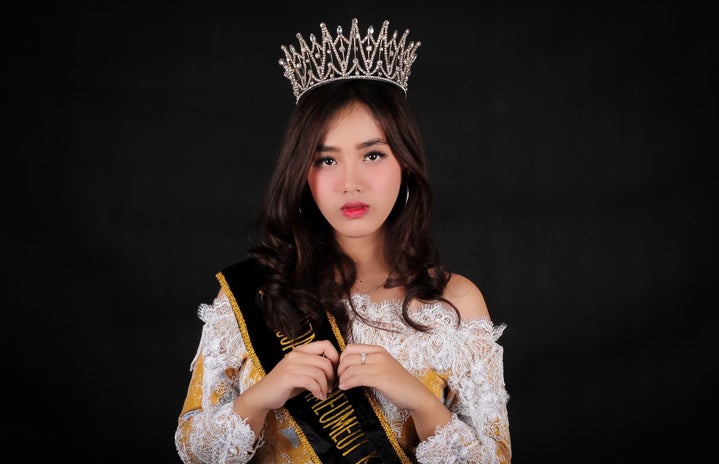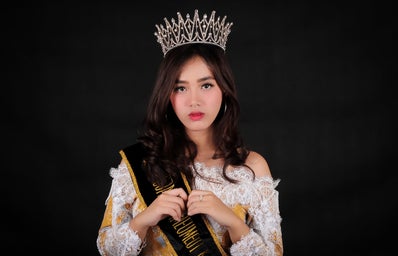One piece of advice that women across the globe get to hear from the people around them and from social media’s chain of motivational pages is that they must always balance and embrace the imaginary crown that glistens on every woman’s head while also ensuring that they fix each others’ crowns. For a selected few, the doors to the realm of universal queenship are opened by pageantry and this imaginary crown materializes.
In simple terms, a beauty pageant is a contest organized locally, nationally, and internationally that judges the contestants based on rigidly forged parameters of beauty. The competition follows a set format and remains extremely exclusionary. However, its nature does seem to have evolved. The competition has tried to disembark from its quest to pursue traditional stereotypes of beauty which can be seen in the participation of ‘plus size’ and transgender beauty queens in what can be called mainstream beauty pageants, Angela Ponce of Spain being a ravishing example of the same. However, corroborating with the dominant trend, these must be considered isolated events. Are beauty pageants fostering sisterhood, solidarity, and empowerment? Should we engage with the illusionary markers of beauty, a fragile and fluid concept that these pageants facilitate for its measurement?
With this article, I try to answer these two questions by striving to throw light on some illusionary notions of beauty that beauty pageants foster, notions that need to be deconstructed at the earliest:
The idea of exclusionary beauty: Age 18 to 25, height 5’3 and above, never married before. I quote this not from the matrimonial section of a national newspaper but the eligibility poster of India’s leading beauty pageant Femina Miss India. Year after year, Femina Miss India and other organizations across the world perpetuate the idea of an exclusionary beauty based on trivialities of heights, ages, and marital statuses that can barely be markers of a woman’s worth. The very recent example is that of the Mrs. Sri Lanka Pageant, 2021. First and foremost the exclusionary nature of pageantry is highlighted by how pageants for single and married women are held separately. Additionally, the outgoing titleholder Caroline Jurie stripped the newly crowned queen of her crown claiming that she was a divorcee and hence unfit to wear the crown with poise. This reflects how beauty pageants have conveniently been able to pitch women against one another. These criteria have ensured that women feel insignificant when they can’t adhere to them. How then can beauty pageants empower women when they can’t help women accomplish the bare minimum, feeling comfortable in their skins?
The idea of unattainable beauty: Recently, Manya Singh, the daughter of an autorickshaw driver was crowned Femina Miss India runner up and while that changed her life, we must see her win as an isolated event. Her win triggered the age-old response that women must dream big to achieve big and while I’m not writing to romanticize her struggles, they do point to how classist a beauty pageant actually is. Every beauty pageant is in reality a fashion contest. Those participating are expected to invest in expensive wardrobes, makeup, and what I think is the most ridiculous thing about beauty pageants, training, and grooming. Vartika Singh, Miss Universe India, 2019 carried more than 10 suitcases with her to compete at the Miss Universe pageant! While it’s difficult to understand how pageant training can accentuate beauty, it’s also difficult to understand how women from low-income groups are expected to dream big if the cost of their dreams remains so high?
The idea of beauty as a commodity: If you follow a beauty pageant, you’d know that it’s a fully commercialized competition. The tickets to the shows are excessively overpriced but wait, at least you can pay to witness beauty! Several pageants are also aired on television in their entirety, starting from the trainings to the shoots to the final night. All this points to how standards of beauty are marketed making their scope even more pervasive and the essence of beauty even more misconstrued.
So far I’ve looked at problems in the structures of beauty pageants. Here is one issue with its conceptualization itself:
The idea of measurable beauty: Since the idea of beauty is both abstract and subjective, the biggest flaw inherent to the conceptualization of beauty pageants is that beauty should be measured, compared, and awarded. Beauty pageants boast of providing their contestants with platforms to use their beauty for a purpose and yet after passing through several rounds of the competition, only one woman’s purpose merges with the goals of the parent organization. The flaw is evident. If beauty is to achieve salvation only on fulfilling a desired purpose, why are contestants eliminated after each round so that only one woman’s beauty and purpose emerges victorious? I do not attempt to define beauty for doing that would be undermining its scope. However, I’d reiterate what has been said by various generations of feminists, beauty comes in all shapes, sizes, colors, languages, sexualities.
On that note, I’d request beauty pageants to stop measuring, comparing, and awarding women based on a concept that knows no bounds.


